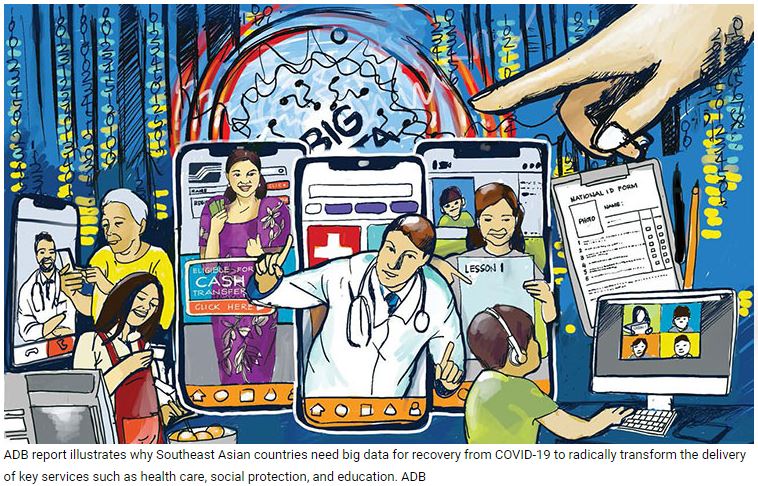Big data key to post-pandemic recovery in Cambodia, says ADB
The increasing use of digital technology and big data hold the key to fast-tracking post-Covid-19 economic recovery in Southeast Asia (SEA), including Cambodia, said an Asian Development Bank (ADB) report launched recently.
The report titled ‘Harnessing the Potential of Big Data in Post-Pandemic Southeast Asia,’ found that public institutions that have embraced big data because of its analytical power to turn voluminous datasets into actionable insights could help them respond swiftly to crises, improve their services, and enhance resilience to future shocks.
Big data could have improved the delivery of government services during Covid-19 and might speed up the post-Covid-19 recovery as well. “For example, many informal sector workers in Cambodia who have lost their jobs due to Covid-19 could not benefit from the government’s cash support programme due to their unregistered status,” the report said, indicating that an effective data collection process would have helped the government to reach out to this left out workers.
In the healthcare sector too, there is a large amount of data from health records that can be leveraged for big data analyses, it pointed out. This database can be combined with data from other sources such as social media, smartphone applications, and remote monitoring systems to support policies related to the prevention, detection, and treatment of diseases.
Big data can also be employed for preventative health surveillance by monitoring the health conditions of populations to detect possible epidemics before they occur. For instance, data from smartphone-connected thermometers can allow for real-time tracking of influenza activity, the report said.
While calling the Cambodia Data Exchange (CamDX) an important initiative by the government to improve data collection and data sharing, the report said the mechanism has so far supported two important applications in the Kingdom — Online Business Registration (OBR) and Validation Application on Payment Guarantee.
CamDX curates data from different information systems into a unified and decentralised data exchange platform to provide a secure and standardized way of accessing data.
The main goal of CamDX is to build an infrastructure that allows for easy access to data in government databases without compromising the security and ownership of the data. As a data exchange platform, CamDX does not store or know the content of the data but instead allows each member to connect with the information systems of other members and exchange data directly through a secure server.
The platform also establishes a foundation for collaboration between the public and private sectors. Government databases such as population and business registries as well as tax, real estate, and/or vehicle registration can be used in combination with data from telecommunication companies, banks, and insurance companies for purposes such as electronic Know Your Customer.
OBR, in fact, is a new business registration platform in Cambodia that allows business owners to register and obtain licences to operate their businesses using a single portal. Through CamDX, the portal can efficiently distribute the data registered by business owners to respective information systems of the Ministry of Commerce, Ministry of Interior, General Department of Taxation, and Ministry of Labour and Vocational Training, thereby reducing the cost and time of business registration.
The first phase of the OBR has been completed, with an estimated approval time of eight days and a 40 percent reduction in the registration fee.
In Cambodia, with the support of ADB, the government has also convened a transitional ‘Big Data Sub-Committee’ which is chaired by the Secretary of State of the Ministry of Economy and Finance.
ADB Director General for Southeast Asia Ramesh Subramaniam during a webinar organised by ADB said, “It is crucial for policymakers across the subregion to help pave the way for big data adoption—from strategic governance to building a data-driven culture.”
In Southeast Asia, the size of the internet economy crossed the $100 billion mark in 2019. By 2025, the value of Southeast Asia’s internet economy could triple to $300 billion.
It has also been estimated that Southeast Asia’s digital economy has the potential to increase annual regional Gross Domestic Product by $1 trillion through 2025 as compared to 2015.
Source: https://www.khmertimeskh.com/501159800/big-data-key-to-post-pandemic-recovery-in-cambodia-says-adb/


 Thailand
Thailand




